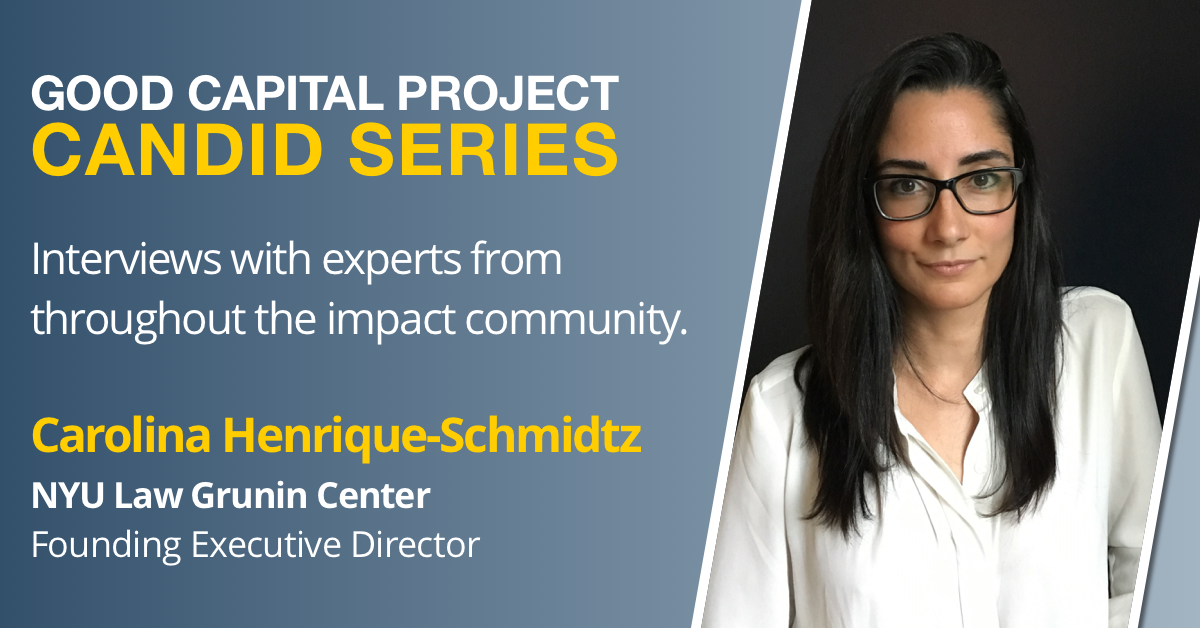
The Grunin Center for Law and Social Entrepreneurship at NYU School of Law, the first center of its kind at a law school, is leading the way worldwide in preparing a new generation of talented, committed, globally oriented lawyers to drive positive impact in the world.
The Grunin Center’s mission is to grow and enhance the community of lawyers and legal institutions engaged in social entrepreneurship and impact investing and to accelerate their effective participation in the field.
To fulfill this mission, the Grunin Center focuses on three pillars: education, knowledge dissemination, and collaboration. The Grunin Center educates students and practicing lawyers about legal issues in the field of social entrepreneurship and impact investing; develops and disseminates knowledge and legal research about law and policy developments in the field; and collaborates with other field-building organizations, universities and research centers.
Good Capital Project: What is the Grunin Center’s origin and mission?
Carolina Henriquez-Schmitz: NYU Law Professors Deborah Kay Burand and Helen S. Scott founded the Grunin Center in 2017 and are its faculty co-directors. They are the brains and the brawn behind it all and true thought leaders in the field of law and social entrepreneurship. The Grunin Center is named after and supported by Jay and Linda Grunin, NYU Law alums whose philanthropic endeavors have been dedicated to investing in innovative projects that create meaningful, transformative change.
I was delighted to join the team earlier this summer, when I became the founding executive director of the center. Our primary mission is to advance learning and foster the development of a global legal community involved in social entrepreneurship and impact investing. We want to help shape a new generation of lawyers who apply their skills to advance social entrepreneurial solutions to some of the world’s most pressing challenges.
GCP: What is the role of the legal community in developing and growing the impact industry?
CHS: There is a critical and pioneering role for lawyers to play in advancing the field of social entrepreneurship and impact investing. As social entrepreneurship and impact investing become mainstream, as companies and investors look not only to financial performance, but also to social and environmental impact, there is a growing need for new legal systems, new legal structures, new legal thinking and innovation. The social impact field also faces a range of unique legal issues that demand a robust legal community of practice that shares knowledge across borders.
Unfortunately, there is a dearth of adequate legal talent to meet the unique needs of social entrepreneurs and impact investors. The relevant legal framework is evolving, with a lack of regulatory and definitional clarity around social entrepreneurship and impact investing. Additionally, there are limited curricular and clinical offerings in this field at law schools, as well as very few continuing legal education opportunities for lawyers already in practice. As a result, few legal professionals have acquired the breadth and depth of knowledge, training and practical experience needed to help social enterprises and impact investors navigate this complex and evolving regulatory environment. This, in turn, inhibits the growth of the field.
GCP: We have noticed business schools integrating a social entrepreneurship curriculum more and more. Is a similar shift occurring in law schools?
CHS: While law schools have lagged behind business schools in this regard, I am happy to report that we are starting to see progress. Over the 2017-2018 academic year, the Grunin Center mapped the extent to which law schools in the US are embedding themes of social entrepreneurship and impact investing into their curricula, extracurricular activities, and legal scholarship. The findings are promising—we learned that at least 30 percent of all accredited U.S. law schools currently are supporting curricular offerings, extracurricular activities, or legal research and writing in the field. And some law schools, like NYU Law, are engaging actively in all three areas.
At the Grunin Center, we are trying to lead by example and to foster opportunities for collaborations with other schools. As part of this effort, we recently launched an annual Legal Scholars Convening, which brings together legal scholars in the fields of social impact investing and social entrepreneurship to share research, and to introduce them to the legal/policy challenges and opportunities that legal practitioners are facing. This Convening takes place immediately after our annual conference (co-sponsored by the Impact Investing Legal Working Group) that is aimed at practitioners who are actively working in the field. Our thought is that combining the two conferences will help legal scholars learn from practitioners and practitioners learn from field-advancing legal scholarship.
The Grunin Center is also in the process of creating a library of teaching tools that could be used by legal educators to embed themes of social entrepreneurship and impact investing into their law school courses. For example, we are planning to create a series of case studies that could be used by law professors. Some of these cases will cross disciplines so that they could be used in business and policy courses as well as law courses.
GCP: That sounds like a pretty good rate of adoption. What do you think is driving it?
CHS: In general, there are a number of contributing drivers. For example, market demand for new legal systems and new legal structures; client demand, such as entrepreneurs and investors seeking legal counsel with experience in the field; and employer demand, such as law firms that want to employ lawyers with relevant academic training to support a new business practice and meet client demand.
At law schools, in particular, students have been a critical driving force for embedding themes of social entrepreneurship and impact investing within curricular and extracurricular activities. We have seen an increased demand from students for legal training in this area, especially for experiential opportunities that gives them exposure to new social enterprise legal forms and impact investment deals. Numerous student-led organizations have also formed with a focus on the lawyer’s role in social innovation, entrepreneurship and impact investing—for example, at NYU Law we have The Social Enterprise & Startup Law Group (SE-SL). Concurrently, we have seen exponential growth in the number of students and young lawyers who attend our annual conference and want to get involved in the work of the Grunin Center.
GCP: How does that play out within law firms? What type of adoption do you see among firms?
CHS: We are seeing notable buy-in from firms, though at a restrained pace. Several large law firms have established new practice groups to respond to growing client demand, particularly around impact finance and social business structuring, while other law firms draw from existing practice groups to work with social entrepreneurs and impact investors on a more ad-hoc basis. Additionally, many law firms are also serving the field by providing limited pro bono legal support to qualifying social entrepreneurs and organizations.
At the same time, some smaller law outfits have sprouted with a dedicated social impact practice to serve social entrepreneurs and impact investors who cannot afford large law firm fees and don’t qualify for pro bono support.
These developments have been aided in no small measure by the growth of the Impact Investing Legal Working Group (IILWG), a network of lawyers that was formed in the early 2010s to explore developments in the field of impact investing, advance legal innovation, and share resources. What started out as an informal collaboration by a few lawyers has grown to consist of close to 200 members who represent a diverse array of organizations, including impact investors, social enterprises, law firms, nonprofit organizations, foundations, and academic institutions.
Much more work remains to be done, of course. To meet the diverse and changing legal needs of the sector, law firms—small, medium and large—will need to offer more tailored and affordable services to social entrepreneurs. My hope is that in time lawyers will become and be seen by their clients as an integral partner in driving positive social impact.
GCP: The Grunin Center has partnered with the Impact Investing Legal Working Group. How did that partnership come about?
CHS: Professor Deborah Burand, faculty co-director of the Grunin Center, is actually a co-founder of the Impact Investing Legal Working Group and has been working closely with many of its members for over a decade.
Among other things, the IILWG organizes conferences where practitioners from around the world gather to share insights and experiences about practicing law in the field of social entrepreneurship and impact investing. With its launch in 2017, the Grunin Center partnered with the IILWG to provide a permanent home at NYU Law to the Annual Conference on Legal Issues in Social Entrepreneurship and Impact Investing—in the US and Beyond. The conference is now in its sixth year and draws leading lawyers, academics, policymakers and other professionals from across the globe to discuss legal developments, challenges and innovations; share tools, resources, and research that help advance the field; and facilitate connections to continue building this important, global community of practice.
The IILWG is a great network to be a part of, and it is an invaluable partner for the Grunin Center, helping us grow a robust community of practice and build bridges between legal practitioners, the legal academy and policymakers in connection with legal developments in social entrepreneurship and impact investing.
GCP: This past June, The Grunin Center and IILWG hosted a successful and informative annual event. The agenda was very robust, which seems to suggest significant traction among the legal community. What were some of the key takeaways and follow-ups to this year’s event?
CHS: Yes! This year we had our biggest and best annual conference, which brought together over 300 lawyers, including practitioners, policymakers and academia, as well as investors, entrepreneurs, and thought leaders from around the globe. The themes we explored included: policy and regulation of impact investing and social entrepreneurship; blending and scaling capital; building investment-ready social enterprises; embedding impact into deal structures; and mainstreaming impact.
Some fantastic news: The legal community engaged in social entrepreneurship and impact investing is growing globally, and we are starting to see more knowledge-sharing across regions, including in emerging markets. We had representation from almost all regions of the world at our conference this year and are working with several other field-building organizations to develop more opportunities to learn from diverse local experiences, and to share best practices, tools and learnings.
Following the conference, we actually partnered with the Bertha Centre for Social Innovation and Entrepreneurship in South Africa to pilot a webinar series that builds on the annual conference programming and provides participants across Africa with an opportunity to learn from international and local legal experts in impact investing. We hope to replicate the series annually, across various regions to support the growth of a global community of legal practice, while further informing and enriching our own work with learnings from other regions.
Speaking of collaboration, the conference also highlighted the importance of bridging the worlds of legal theory and practice to grow the field. This year, we had a larger number of academics than ever before at the conference, which led to very fruitful contributions between practitioners and legal scholars. For example, Professor Anne Tucker of Georgia State University College of Law presented her findings from empirical research of terms used in impact fund agreements and investment documentation, which helped practitioners understand how impact is actually being embedded into deal structures and terms.
Where work remains to be done? Conference participants generally agreed there is a need for more empirical data on legal innovations and challenges, to help the field understand what is working and what is not, and where the white spaces are.
GCP: There is a broader challenge of innovations being deemed proprietary and kept in house. What is the Grunin Center doing to ensure learning and innovations do not occur on a one-off basis?
CHS: In addition to hosting the annual conference and other programing to share learnings and legal developments, this year the Grunin Center launched the Grunin Prize, which raises awareness of and celebrates the critical role lawyers are playing in designing, implementing, and advancing social entrepreneurial solutions. Through the Grunin Prize, we are looking to advance legal innovations within the impact space and inspire lawyers, educators, and policy makers to follow suit.
The inaugural prize was awarded to a legal team from Womble Bond Dickinson for developing a pioneering investment project called Performance Aligned Stock. The legal team worked closely with their clients and other stakeholders to help them achieve specific goals. Their commitment to collaboration and innovation embodies the mission of the prize.






